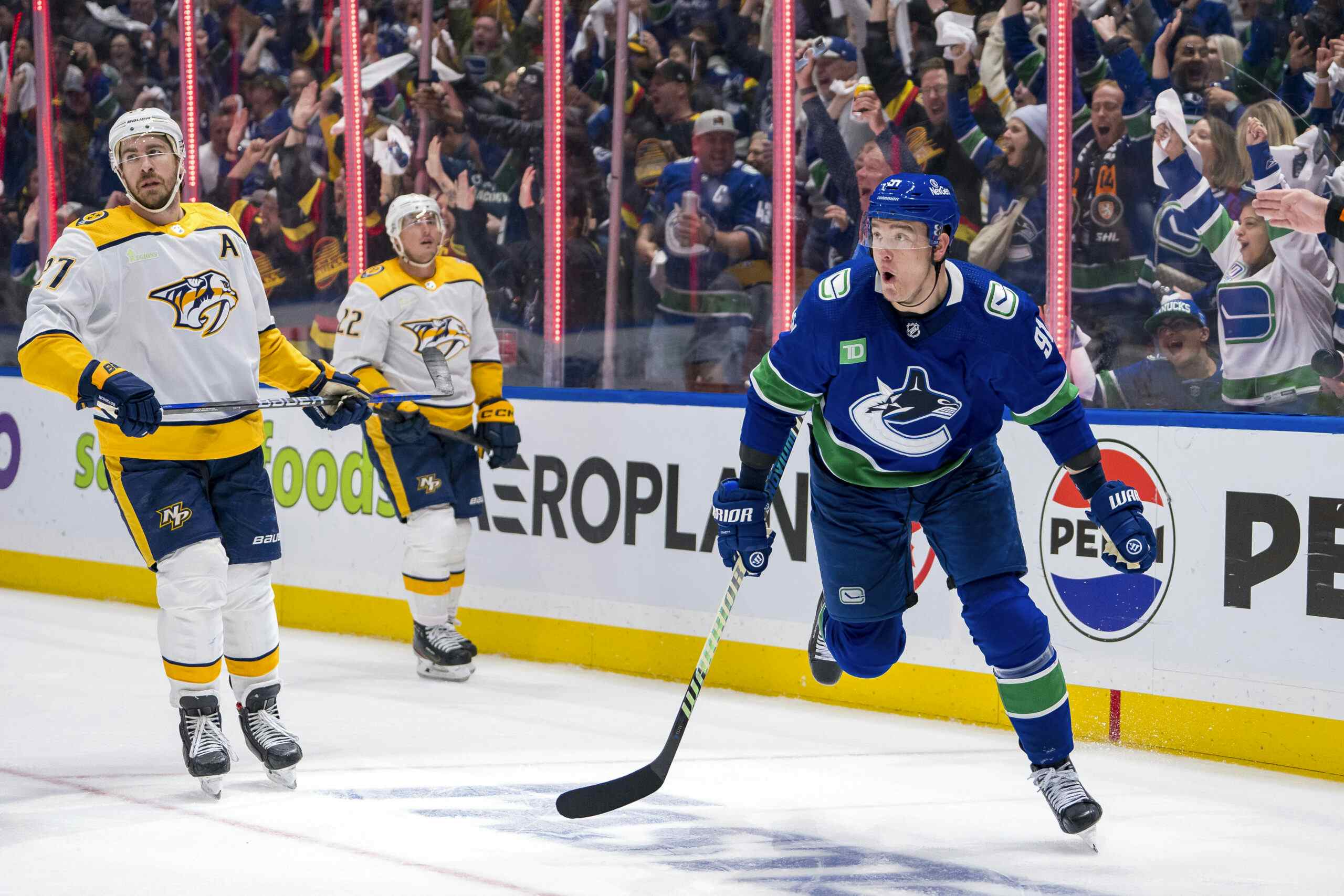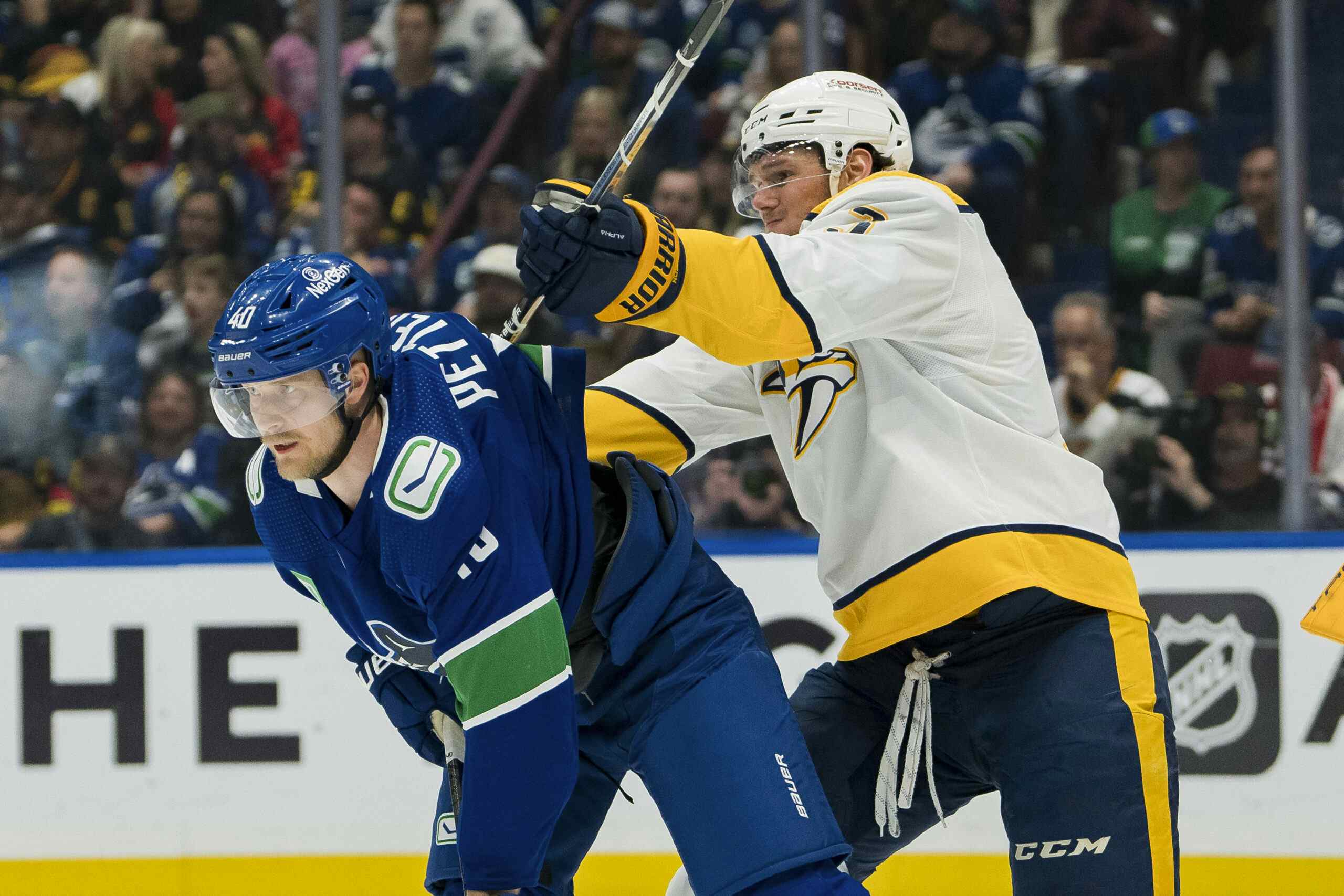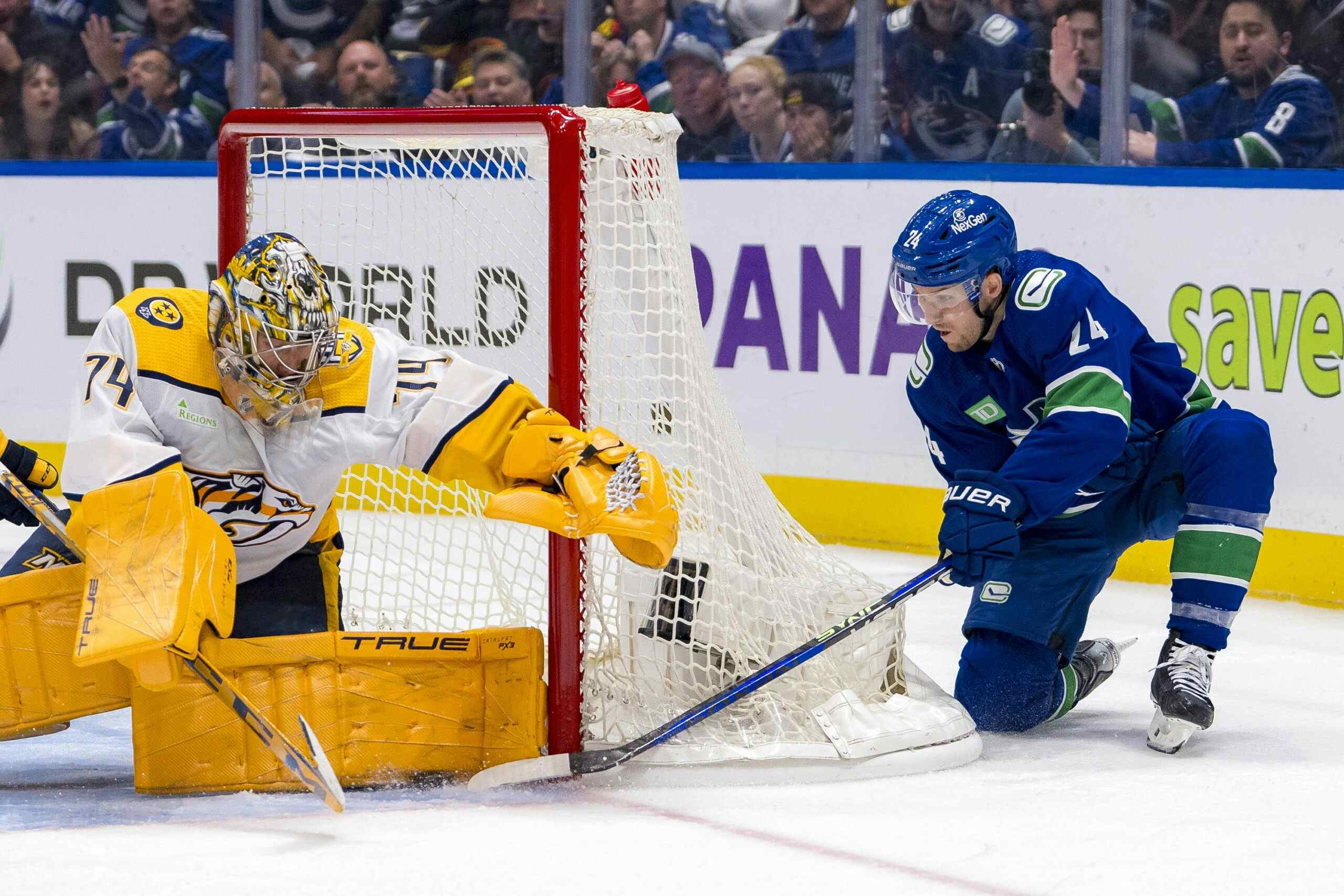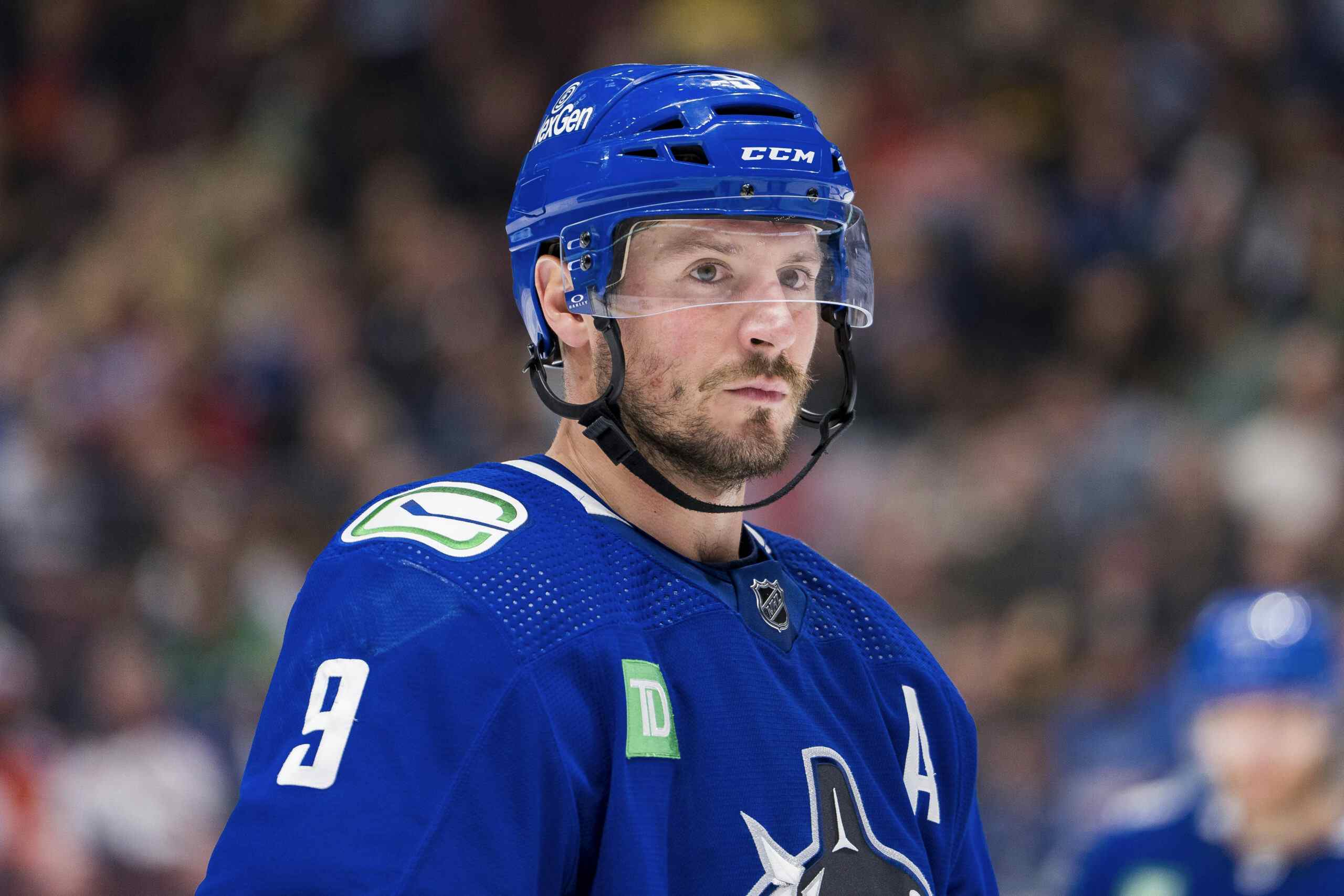The Jim Benning Five-Year Rewind: Hiring Willie Desjardins

Welcome back to yet another edition of The Jim Benning Five-Year Rewind. If you’re new to the series, we’re slowly winding our way through Jim Benning’s tenure as General Manager of the Vancouver Canucks—with the benefit of five full years of hindsight.
Whenever we hit the five-year anniversary of a major Benning transaction—give or take a few weeks—we’ll take a look at how that move worked out in the long-term. Aside from minor trades and signings, we’ll be going over everything Benning has done—the good, the bad, and the Loui.
This time around, we’re fudging the dates a little bit. Jim Benning hired Willie Desjardins as head coach of the Vancouver Canucks on June 23, 2014—so we’re well past the five-year anniversary. However, Desjardins also made his regular season coaching debut for the organization on October 8, 2014, and that’s all the justification we need to take a real good look at Desjardins’ time with the team.
The Contract
Willie Desjardins signed as Head Coach
Four-Year Term
Salary Not Disclosed
Desjardins By The Numbers
There are those who will call Willie Desjardins the worst head coach in Vancouver Canucks history—but it’s a difficult statement to justify.
Between his hiring during the 2014 offseason and his eventual firing in April of 2017, Desjardins had a record of 109-110-27—nothing to get excited about, but a far cry from a historical failure. You might be surprised to learn that Desjardins actually sits fifth overall in the ranking of Vancouver head coaches by winning percentage with .498—trailing just Alain Vigneault, Marc Crawford, Pat Quinn, and John Tortorella. His 109 wins are also ranked fifth in franchise history.
That being said, Desjardins’ record is built primarily on his inaugural season with the organization—in which a roster that he and Jim Benning inherited from John Tortorella and GM Mike Gillis soared to an improbable 48-29-5 record before crashing in the first round of the playoffs.
Take away that season, and Desjardins is left with a record of 61-81-22 and a winning percentage of .429—which sounds a lot more like the Coach Willie that fans are familiar with. He’s also responsible for two of the Canucks’ worst finishes in the modern era—though that also had an upside, as we’ll get to in a moment.
In short, it’s not fair to say that Desjardins was the least successful coach in Canucks history—but it’s also clear that he was, for the most part, a failure in terms of the team’s performance.
Whether that makes him a failed hire or not depends on how much one believes Benning and the Canucks’ front office truly intended on contending for the playoffs from 2015 to 2017—but that’s a debate for another time.
From an objective perspective—and by the numbers—Desjardins’ tenure was not a success.
Desjardins Versus Other Coaching Options
It will never be known whether or not any other candidates were seriously considered by Jim Benning before hiring Willie Desjardins, but rumours were definitely swirling at the time. Then-Los Angeles assistant John Stevens was the name that popped up the most in conjunction with the Canucks—though he’d have to wait until the 2017/18 to get his next head coaching assignment.
Somewhat ironically, when Stevens’ tenure as the Kings’ head coach ended 13 games into the 2018/19 season, he was replaced by none other than Willie Desjardins. The fact that Stevens only lasted 95 regular season games with the Kings—along with a four-game postseason sweep in 2017/18—is probably a fair testament to the notion that he wouldn’t have been much of an upgrade over Desjardins, if any.
Another name attached to the Canucks in the summer of 2014 was former Vancouver assistant Mike Johnston—who eventually went to the Pittsburgh Penguins as Dan Bylsma’s replacement. Johnston’s tenure with the Penguins was even shorter than Desjardins’ with Vancouver—lasting just 110 regular season games. Johnston was fired partway through the 2015/16 season—and has since gone back to coaching in the WHL.
As far as these three names go, it seems that Desjardins was an adequate selection as head coach.
There were a handful of other individuals hired to NHL head coaching positions during the 2014 offseason, however, and each of them enjoyed more success with their new organizations than Desjardins did with the Canucks. Gerard Gallant and Bill Peters revitalized the Panthers and Hurricanes respectively, and Barry Trotz went on to win a Stanley Cup with the Capitals. The only coach hired in 2014 to still be employed by the same team, however, is Peter Laviolette—now entering his sixth season as Nashville bench boss.
There’s no way of knowing if any of Gallant, Peters, Trotz, or Laviolette would have been interested in joining the Canucks organization—or whether Jim Benning ever expressed interest in hiring them. In any case, their existence provides solid proof that there were at least four potential head coaches on the market that would have been better options than Desjardins—and the real number is probably quite a bit higher.
Why Willie Frustrated Fans
Of course, numbers never tell the full story. Vancouver’s current coach, Travis Green, has also overseen a couple of miserable finishes—and yet he’s faced nowhere near the level of criticism that Canuck fans hurled at Willie Desjardins on a consistent basis.
Like all coaches, Desjardins has his quirks and faults—but unlike most, Willie’s strange habits seem designed to infuriate his team’s fanbase.
Every coach has their favourites, but Desjardins’ penchant for elevating fringe NHL talents—Jayson Megna, Matt Bartkowski, Michael Chaput, and the like—to roles far beyond the scope of their talent borders on the compulsive. Time and again, a player like Megna would find themselves on the ice late with the Canucks down by a goal—resulting in more than a few remotes being thrown at TV screens across British Columbia.
The most egregious example of Desjardin’s favouritism foibles is his treatment of Linden Vey—a player who Desjardins coached in Medicine Hat, and who he recommended the Canucks trade for. Despite his middling ability to transfer his offensive production to the big leagues, Vey received endless opportunities in the Vancouver top-six and on the powerplay. After being let go by the Canucks in 2016, Vey would go on to play just four more games at the NHL level.
Desjardins The Rebuilder
We’ve spent a lot of time discussing Wille Desjardins’ shortcomings as a coach—but we fully realize that that’s not a controversial opinion or something that needs to be proven to the fanbase. There are very few Willie defenders left in Vancouver, and most had turned on him even before he was fired by the Canucks. If not, Desjardins’ brutal showing in Los Angeles—where he regularly benched Ilya Kovalchuk—should have scared away the final few members of his booster club.
That’s why at this point we’re going to switch gears and talk about the good side of Desjardins’ time with the organization—namely the contributions that he made to Vancouver’s rebuild.
First and foremost, Willie’s inability to put wins on the board resulted in the Canucks drafting fifth overall in two consecutive drafts. Olli Juolevi is still a work in progress, but the 2017 Entry Draft yielded Elias Pettersson—hands down the central figure in Jim Benning’s reconstruction of the Canucks. We’d never suggest that this was Desjardins’ intention—he definitely didn’t mean to lose so much that it cost him his job—but it’s a quite a silver lining to the dark cloud of his tenure.
Desjardins contributed more directly to the rebuild, however, through his development of several key individuals. Through his time in the WHL and AHL, Desjardins was renowned for his ability to propel players through his system and onto bigger and better things—and that’s a large part of the reason why he was hired to oversee a time period in which the Canucks were not projected to compete. In that regard—and perhaps that regard alone—his hiring could be considered to be at least a partial success.
Both Jacob Markstrom and Troy Stecher made the transition to full-time employment with the Canucks in a successful manner under Desjardins. Both remain integral parts of the Vancouver core moving forward—and neither of them looked like a sure thing when they joined the organization. Brock Boeser only played nine games under Desjardins, but they were inordinately successful games—and one has to imagine that Coach Willie played at least some role in Boeser’s smooth entry into the big leagues.
Desjardins’ lasting legacy as coach is most apparent, however, in the development of Bo Horvat—the heart-and-soul of the Canucks’ rebuild and soon-to-be captain. Desjardins received a ton of criticism for his initial treatment of the young pivot—starting Horvat in the AHL despite a strong training camp, and then forcing him to toil on the fourth line for a while despite a talent-level that plainly surpassed most of the players ahead of him on the depth chart.
Notwithstanding these critiques, Desjardins’ handling of Horvat clearly paid off. Rather than pouting, Horvat responded to the challenge by slowly-but-surely working his way up the lineup—and Desjardins continued to make him work for every opportunity. By the time the Canucks’ matched up with the Calgary Flames in the first round of the 2015 Stanley Cup Playoffs, Horvat had become a vital cog in the team’s offense—putting up four points in six games. More importantly, he did so without ever sacrificing any of his trademark defensive responsibility. Horvat further progressed under Desjardins’ guidance for the next two seasons, and now he’s one of the best second-line centers in the entire NHL—after being touted as a draft pick with a third-line ceiling. Willie doesn’t deserve all the credit for Horvat’s rapid progress—but he definitely deserves some of it.
Of course, even Desjardins’ ability to inspire progress in his young charges did not come with a perfect record. Both Jake Virtanen and Jared McCann struggled to make the transition to the NHL under Desjardins—and Willie’s clashes with Nikita Tryamkin practically drove the hulking defenseman back to Russia. Tryamkin bears a large portion of the responsibility for his own failings, but he also cited a lack of communication and clear expectations from Desjardins—evidence that Desjardins’ motivational stylings are far from universal.
Final Word
The final word on whether or not Willie Desjardins was a successful hire depends entirely on how much one believes that Jim Benning and Co. truly intended to compete for the playoffs during Desjardins’ tenure. If you buy the lie of trying to qualify for the postseason year-in and year-out that Benning sold to assuage the more short-term thinkers in the fanbase, then Desjardins is undoubtedly an unmitigated failure.
If you instead believe—as this author does—that Benning was attempting to conduct a relatively stealth rebuild, however, then the Desjardins hire starts to show its redeeming qualities. Desjardins has always been a strong developmental coach—and he’s gone right back to that role with the Medicine Hat Tigers as of the 2019 offseason. In his time with the Canucks, the organization acquired and developed young talent at a rate that is more-or-less unprecedented in franchise history.
In other words, Desjardins’ tenure contributed greatly to the rebuild that the Canucks are finally starting to benefit from as the 2019/20 season unfolds and—whether or not those contributions were intentional or not on Benning’s part—at least that gives the Vancouver fanbase reason to be grateful that the Desjardins era came and went.
Recent articles from Stephan Roget





